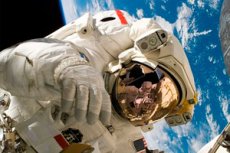New publications
Astronauts suffer from back pain due to gravity
Last reviewed: 02.07.2025

All iLive content is medically reviewed or fact checked to ensure as much factual accuracy as possible.
We have strict sourcing guidelines and only link to reputable media sites, academic research institutions and, whenever possible, medically peer reviewed studies. Note that the numbers in parentheses ([1], [2], etc.) are clickable links to these studies.
If you feel that any of our content is inaccurate, out-of-date, or otherwise questionable, please select it and press Ctrl + Enter.

Astronauts, by the nature of their work, are forced to spend a long time in space, in conditions unusual for humans. The latest research has shown that in zero gravity, the back muscles atrophy, which affects even several years after returning to Earth.
Doctors noted that many astronauts complained of back pain, and the pain could bother them both during and after space travel. To find out the causes of pain in astronauts, specialists decided to examine three crew members from the National Space Agency (NASA). Each of the subjects spent 3 to 7 months on the space station. Specialists conducted magnetic resonance imaging three times - once before returning, the second time after that, and the last time 1-2 months after returning from the station. As a result, it was found that microgravity did not affect the intervertebral discs, but the paravertebral muscles underwent significant changes. Scientists noted that in zero gravity, the mass and area of the muscles became significantly smaller, perhaps this factor affects the growth of astronauts (as is known, a person's height increases in space). The experts also reported that even some time after returning from space, the muscles do not recover, but scientists cannot yet say how dangerous this is for a person's overall health; for this, more research is needed. At this stage, experts believe that special exercises will help astronauts avoid back problems. This is what the scientists are currently focusing on - they will have to develop a set of exercises that will help keep the back muscles in good shape even in zero gravity.
It is worth noting that back problems are only part of the problems that astronauts have to deal with during long space flights. Doctors have previously reported on the dangers of space radiation, which penetrates any surface and provokes brain dysfunction and dementia. Another research group found that space travel has a negative impact on the heart. Experts noted that almost all participants in the Apollo program suffer from cardiovascular diseases.
But despite the disappointing conclusions of scientists, flights into outer space will not be stopped. In one of the aerospace corporations, specialists are developing a method of putting astronauts to sleep to make long flights to other planets. By the way, this research is financed by the space agency NASA.
It has become known that scientists intend to put astronauts into stasis – a state that resembles bear hibernation. Such measures are necessary, scientists believe, since flights can take quite a long time, from several months to several years.
The new technique will be tested on astronauts who will fly to Mars, i.e. travel 55 million kilometers.
According to calculations, a flight to Mars should be quite expensive, more than 10 tons of food alone would be needed for the entire trip, and the space module itself would weigh about 30 tons. But immersing space travelers in a state of stasis would make the flight cheaper, since it would reduce the area and weight of the spaceship, as well as reduce food costs (food would be administered to the astronauts intravenously).

 [
[